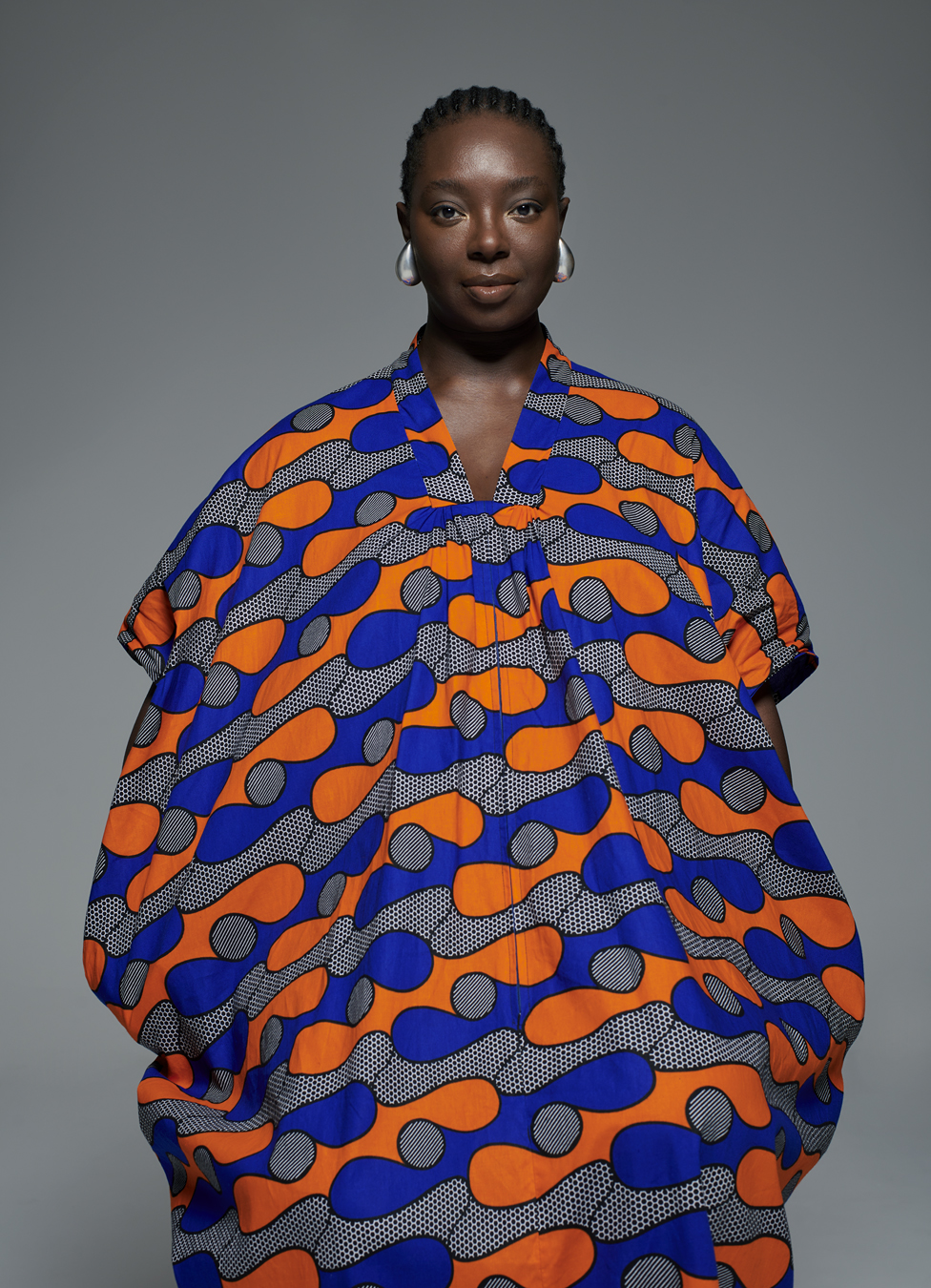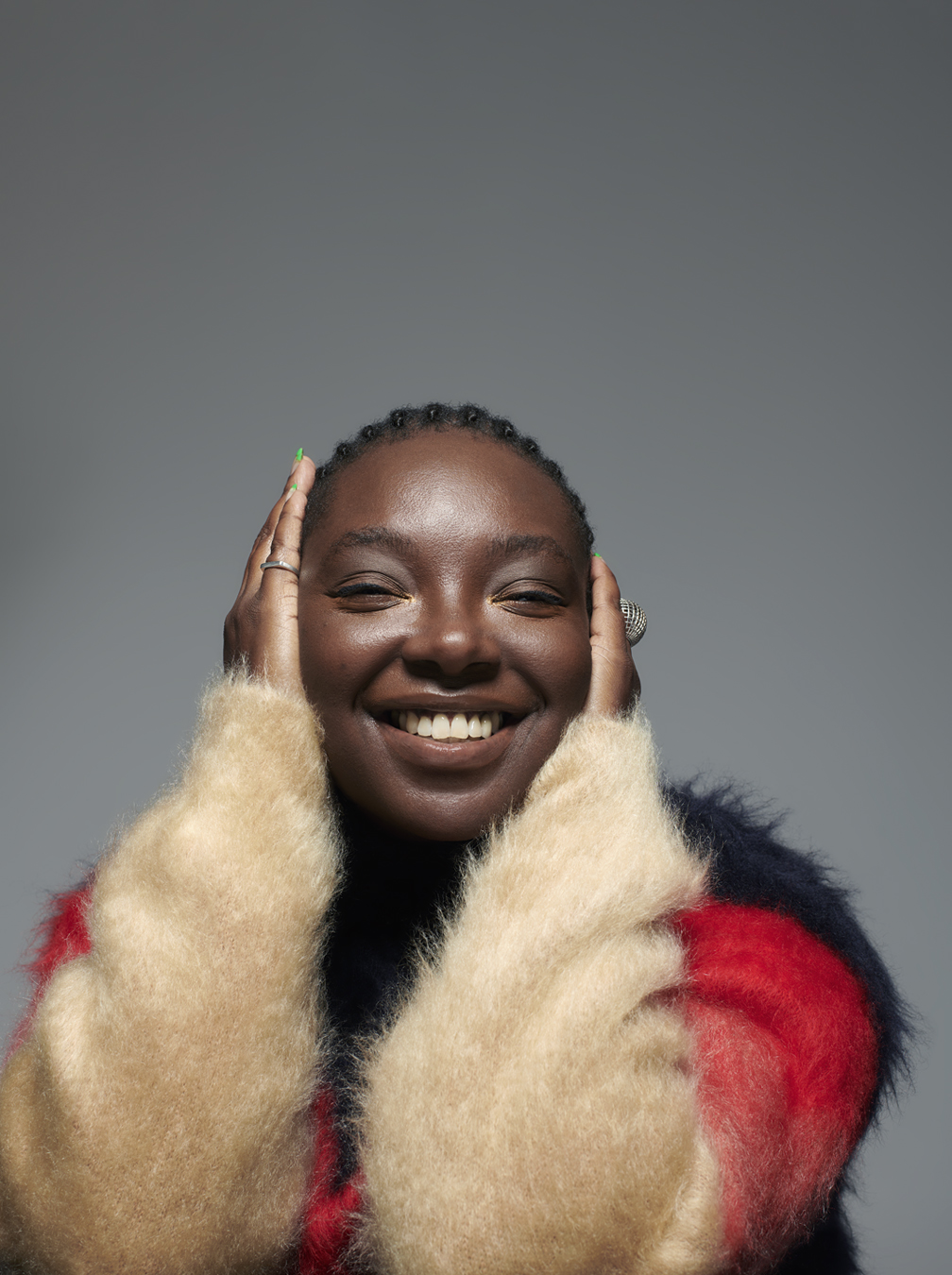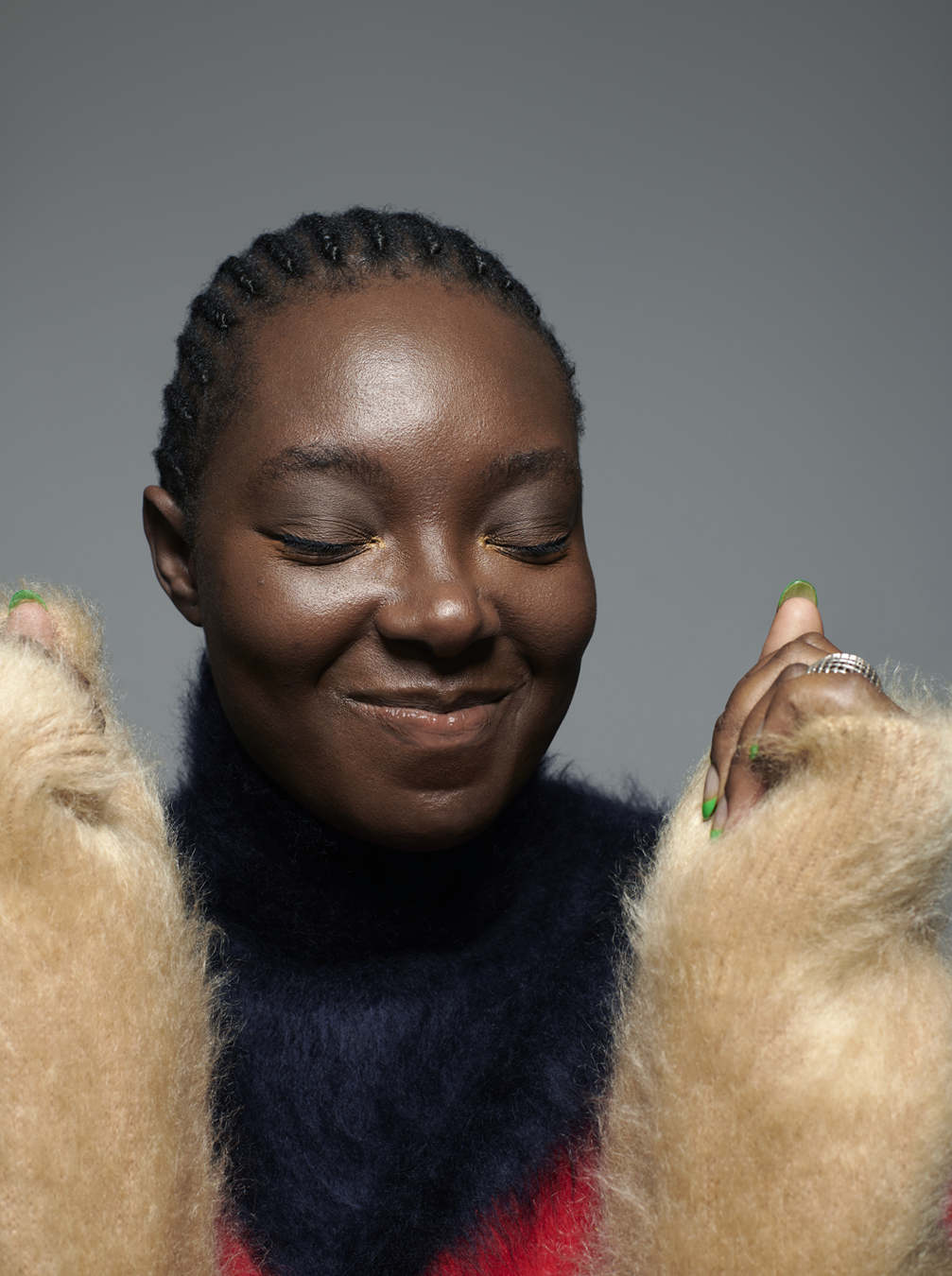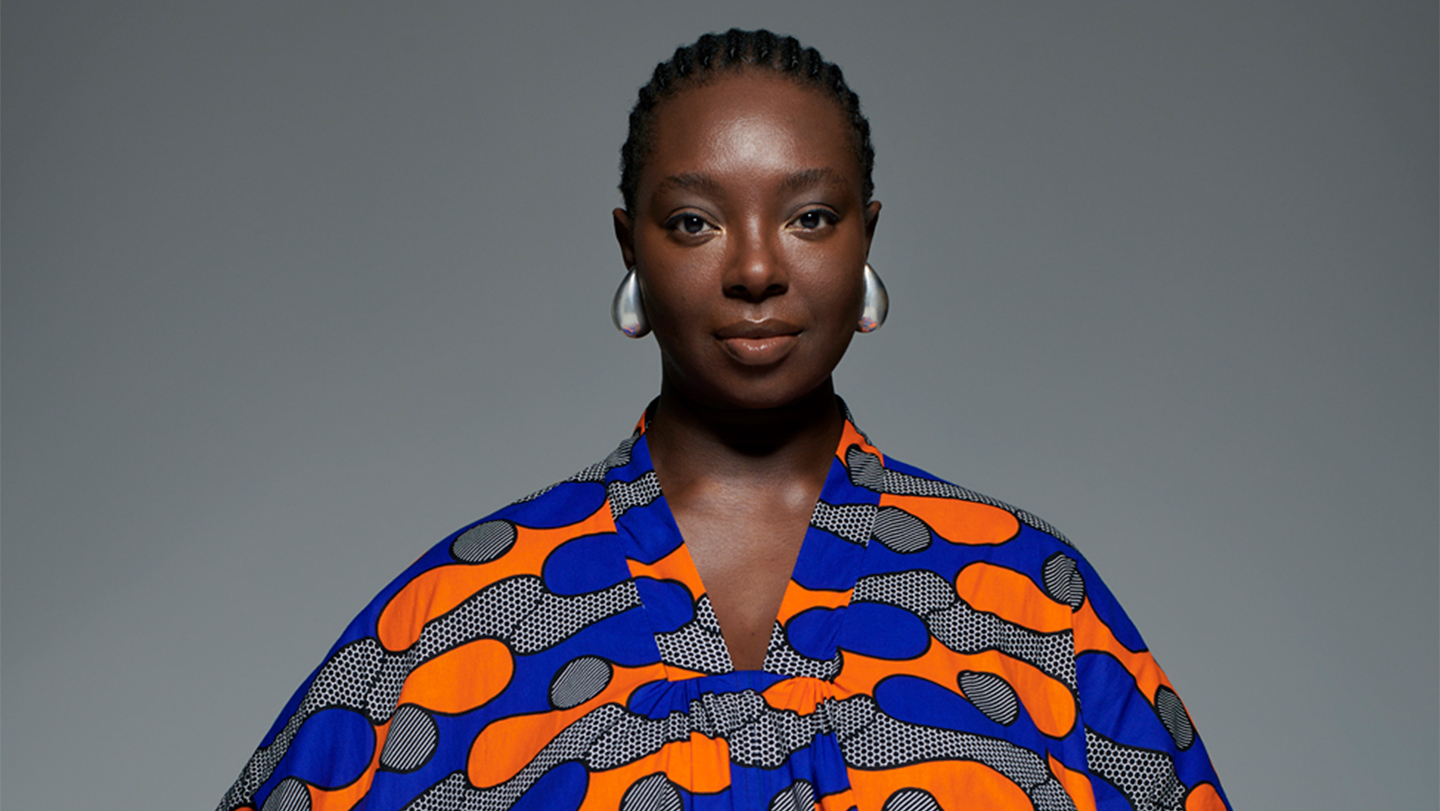This story originally appeared in i-D’s The Royalty Issue, no. 370, Winter 2022. Order your copy here.
That sound is a crucial aspect of how a fashion show is perceived is, of course, a well known fact. But it takes a truly knockout soundtrack to bring that fact to life. At its best, a soundtrack serves as a sonic foil to the clothes that file down a runway, an audible manifestation of the dreamed-up worlds they’re a part of. A surefire example of what a successful one sounds like came during the most recent season in Milan, at Matthieu Blazy’s sophomore show at the helm of Bottega Veneta.
In a post-industrial space transformed by a technicolour poured resin floor, and blockish marbled plastic chairs by Italian artist Gaetano Pesce, guests were welcomed into an exhibition-worthy preschool fantasy by the sound of eerie gong chimes, celestial synths, and gently throbbing bass. This brooding aural setting was the work of Manchester-based composer, producer and DJ, Henrietta Smith-Rolla, better known as Afrodeutsche.
“I still haven’t really come down from it,” she beams over FaceTime from the set of this very shoot in Brussels, a palpable warmth emanating from the screen. “Every sense was stimulated with that show. When I showed up to the set for the first time and no one was there, I just wanted to play! Musical chairs anyone?!” This spirit of playfulness ticked over into the eclectic maelstrom of sounds that carried the models along the kaleidoscopic runway: twangy guitar passages, wistful whistles, weeping strings, snippets of Gaetano’s musings, and 808 bass. Echoing the rich, not-quite-as-it-seems textural plays of the garments, the sweatshirts and plaid shirts that revealed themselves to be silk-smooth leather when touched; knits that bounced with heavy fringe; sharp, knife-pleated trousers with aerodynamic ‘fins’ running down the reverse. It added a crucial layer to the narrative of exquisite, contemporary craftsmanship that Matthieu is making his hallmark at the house.
It’s a craft that Henrietta has been honing since she was a child, growing up in Devon during the 80s. It was then that she first picked up a musical instrument, thanks to a council-run scheme where she was given a violin. As well as the typical classical passages one would expect, however she used her new tool as a means to echo the sounds of the world around her. “I’d always listen to TV theme tunes and play them back,” she chuckles, “I would even record myself on cassette and then duet with it! Basically, anything audio was like food to me.”

Her hunger only accelerated when the musician moved to Manchester in her 20s, where she embarked on the musical journey that laid the base for the range that defines her work today. “Manchester is a city that really welcomes people being themselves, and it’s there that I ended up in lots of different bands – I was in one called The Part Time Heliocentric Cosmo Drama After School Club,” a fifteen-person collective that celebrated Sun Ra’s experimental jazz. “I was also in an electronic Icelandic folk band – it was bonkers.”
It was there, too, that she first discovered what she now cites as some of her most formative influences: the grungy electro and techno of Detroit based producers like Drexciya and Underground Resistance. “It was a real eureka moment for me,” she recalls with warm nostalgia. “When I first heard it, I was like ‘Wait, what?’ Something switched in me, and I suddenly realised that this was something I could make — not what I was hearing, exactly, but rather the freedom that it created within me. There were real moments in these tracks. It was glitched-out, electronic storytelling.” It’s an ethos that’s carried through into her work today: palpable on her transportative 2018 album, Break Before Make, in her scores for documentaries like Kamali – a tale of a young Indian female skateboarder, and her dizzyingly euphoric, four-to-the-floor sets at hallowed techno locales like Berlin’s Berghain, London’s Fabric and Amsterdam’s Dekmantel. For Henrietta, though, her connection to her midwestern forebears is about more than just music; rather, she deeply resonates with the project of Black cultural emancipation and identity consolidation that served as the foundation of their work.

A clue to that lies in her stage name, a term she first came across when researching her estranged father – a Ghanaian man who travelled to Germany for a scholarship in the 60s, where he then settled. It also nods to Underground Resistance’s seminal track, “Afrogermanic”. “Afrodeutsch – this word just kept appearing, and felt like such a heavy word,” Henrietta says. “I wanted to know what it meant, and if anyone still used it – so I spoke to many of my German friends,” who shared that its contemporary usage is neutral, but primarily demographic in nature. Aware of the overlooked status of Germany’s small but significant African diaspora, she therefore chose to use the term as her moniker as a proud mark of visibility. It’s had a powerful effect. “I’ve often met African Germans that have come to my gigs, and they’ll tell me that they’d also started identifying as Afrodeutsch,” she proudly shares.
This pride in helping others to understand the nuances of their identities translates in the images printed here. A self-professed lover of wigs, this marks the first time that Henrietta has been photographed wearing her natural hair. “I’m showing a side of myself that has never been seen before, she says. “Now just felt like the time to do it, but I could only have done it with Pierre Debusschere,” Bottega Veneta’s Image and Music Director, and Henrietta’s close friend. “Being photographed by him was just a revelation, he reveals the beauty of Blackness, rather than making it a spectacle.”
That respect and admiration is, of course, felt both ways. First meeting at a festival just before the pandemic when Pierre asked Henrietta for a lighter, their friendship blossomed over the past two years to the point that, when he was tasked with choosing a composer to score the soundtrack for Matthieu’s sophomore show, she was his instinctive choice. “I was so honoured when he asked me,” she says. “Pierre’s musical ear is truly stunning, and it was such a beautifully collaborative process. When I first started working on it, he and Matthieu just said, ‘Do exactly what you want’”– a brief that she fully indulged in.
While it may seem rare to be offered such free creative rein for such an established house, it’s a testament to the values at the heart of Matthieu’s Bottega Veneta. “Matthieu is someone who has given himself the freedom and licence to do what he feels right,” she says. “There’s a subtle, matter-of fact confidence to him and his work,” an attitude that informs his approach to collaboration. “It’s just been so enjoyable,” she smiles. “It’s been the coming true of a childhood dream.”

Credits
Photography Pierre Debusschere
Lighting assistance Gretar Gunnlaugsson
Digital assistance Sander Muylaert
Executive producer Rebecca Cuglietta
Head of production Dejan Poletan
Production co-ordinator Bianca Cecilia Nonni
All clothing and earrings (worn throughout) BOTTEGA VENETA. Rings model’s own

